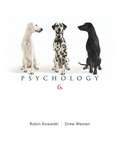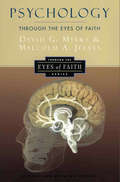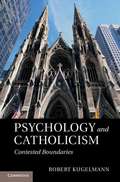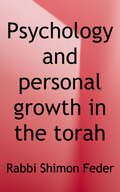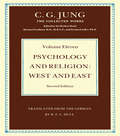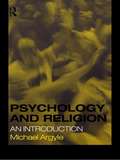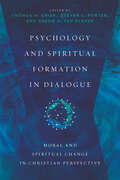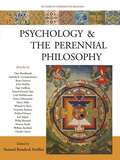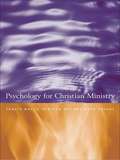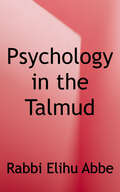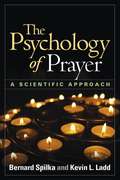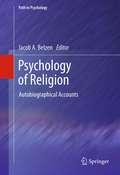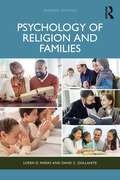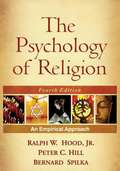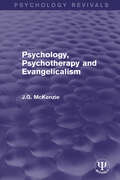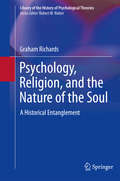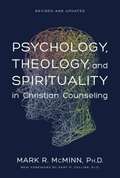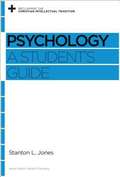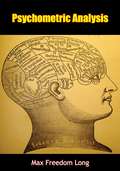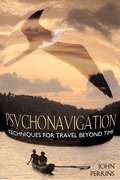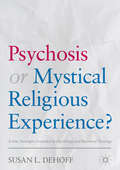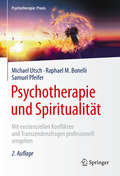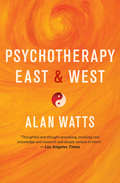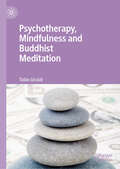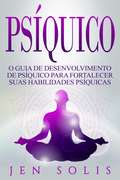- Table View
- List View
Psychology (6th Edition)
by Drew Westen Robin M. KowalskiPsychologists will discover the inherent drama and indispensable human component of psychology science with this updated text. The Research in Depth feature presents classic case studies along with exercises that help reinforce concepts related to research methodology. New Psychology at Work sections offer information specifically related to I/O or human factors as well as describe the role that psychology plays in various applied settings. Profiles in Positive Psychology also gives psychologists a look at the application of psychology to their daily lives, and exposes them to key topics in positive psychology
Psychology Through the Eyes of Faith
by David G. MyersIdentifies the major ideas that college and university students will encounter in a basic psychology course and explores connections with Christian belief.
Psychology and Catholicism
by Robert KugelmannIn this historical study of psychology and Catholicism, Kugelmann aims to provide clarity in an area filled with emotion and opinion. From the beginnings of modern psychology to the mid-1960s, this complicated relationship between science and religion is methodically investigated. Conflicts such as the boundary of 'person' versus 'soul', contested between psychology and the Church, are debated thoroughly. Kugelmann goes on to examine topics such as the role of the subconscious in explaining spiritualism and miracles; psychoanalysis and the sacrament of confession; myth and symbol in psychology and religious experience; cognition and will in psychology and in religious life; humanistic psychology as a spiritual movement. This fascinating study will be of great interest to scholars and students of both psychology and religious studies but will also appeal to all of those who have an interest in the way modern science and traditional religion coexist in our ever-changing society.
Psychology and Personal Growth in the Torah
by Rabbi Shimon FederWith a uniform and predictable structure, each of the shmuzim in this compilation provides readers with a quick burst of inspiration. This book is a collection of inspiring and intriguing weekly emails on the parashah of the week that were sent to thousands of readers. These divrei Torah have piqued the interest of both observant and non-observant Jews through their novel insights and themes relevant to everyday life. For all knowledge levels and backgrounds, this edition is a perfect accompaniment to the Shabbos table, an enjoyable independent read, and a useful tool for Torah teachers.
Psychology and Religion Volume 11: West and East (Collected Works of C.G. Jung #50)
by C.G JungSixteen studies in religious phenomena, including Psychology and Religion and Answer to Job.
Psychology and Religion: An Introduction
by Michael ArgyleFirst published in 1999. Routledge is an imprint of Taylor & Francis, an informa company.
Psychology and Spiritual Formation in Dialogue: Moral and Spiritual Change in Christian Perspective (Christian Association for Psychological Studies Books)
by Thomas M. Crisp Steven L. Porter Gregg A. Ten ElshofCan the phenomena of the human mind be separated from the practices of spiritual formation—of growing to have the mind of Christ? Research into the nature of moral and spiritual change has revived in recent years in the worlds of psychology on one hand and theology and philosophy on the other. But psychology and spiritual formation draw upon distinct bodies of research and theory grounded in different methodologies, resulting in conversation that has suffered from a lack of interdisciplinary cross-pollination. Rooted in a year-long discussion held by Biola University's Center for Christian Thought (CCT), this volume bridges the gaps caused by professional specialization among psychology, theology, and philosophy. Each essay was forged out of an integrative discussion among theologians, psychologists, philosophers, New Testament scholars, educators, and pastors around the CCT seminar table. Topics that emerged included relational and developmental spirituality, moral virtue and judgment, and suffering and trauma. Psychology and Spiritual Formation in Dialogue speaks across disciplinary divides, fostering fruitful conversation for fresh insights into the nature and dynamics of personal spiritual change. Contributors include Justin L. Barrett, School of Psychology, Fuller Theological Seminary Earl D. Bland, Rosemead School of Psychology, Biola University Ellen T. Charry, Princeton Seminary John H. Coe, Biola University Robert A. Emmons, University of California, Davis Stephen Evans, Baylor University Bruce Hindmarsh, Regent College, Vancouver Marie T. Hoffman, New York University James M. Houston, Regent College, Vancouver Steven J. Sandage, David R. Paine, and Jonathan Morgan, Boston University Siang Yang Tan, School of Psychology, Fuller Theological Seminary Everett L. Worthington, Jr., Brandon J. Griffin, and Caroline R. Lavelock, Virginia Commonwealth University Edited by Thomas M. Crisp, professor of philosophy, Biola University Steve L. Porter, professor of theology, spiritual formation, and philosophy, Talbot School of Theology and Rosemead School of Psychology, Biola University Gregg Ten Elshof, professor of philosophy, Biola University
Psychology and the Perennial Philosophy: Studies in Comparative Religion
Modern psychology is at an impasse as it searches anxiously for new therapies to address the increasing occurrence of mental illness in contemporary society. In this groundbreaking anthology, leading authors from the perennialist school, including Huston Smith, Seyyed Hossein Nasr, and Frithjof Schuon, draw on the age-old insights of the world&’s wisdom traditions to argue that modern psychology—behaviorism, psychoanalysis, humanistic and transpersonal psychology—overlooks the specifically spiritual factors contributing to mental health and illness.
Psychology for Christian Ministry
by Fraser Watts Rebecca Nye Sara SavageThis introduction to psychology has been devised for those training for and working in the clergy. Ideal both as a professional handbook and a textbook, it covers social, developmental, educational, occupational and counselling psychology, as well as the psychology of religion. It carefully considers the processes of personal change and growth central to religion.
Psychology in the Talmud: Guidelines for Simchah and Personal Growth
by Rabbi Elihu AbbeThis book uncovers important insights from the Jewish tradition and offers tools for success, joy, growth, and inspiration. Timeless ideas are elaborated on from the writings of classical Torah commentaries as well as current leaders in the fields of psychology and personal growth. Short summaries enable readers to more easily implement these crucial concepts into their lives.
Psychology of Prayer
by Kevin L. Ladd Bernard SpilkaReviewing the growing body of scientific research on prayer, this book describes what is known about the behavioral, cognitive, emotional, developmental, and health aspects of this important religious activity. The highly regarded authors provide a balanced perspective on what prayer means to the individual, how and when it is practiced, and the impact it has in people's lives. Clinically relevant topics include connections among prayer, coping, and adjustment, as well as controversial questions of whether prayer (for oneself or another) can be beneficial to health. The strengths and limitations of available empirical studies are critically evaluated, and promising future research directions are identified.
Psychology of Religion
by Jacob A. BelzenIn the past four decades or so, the so-called psychology of religion - after having been deemed extinct, impossible or unlikely - has risen to prominence again: the number of publications is rapidly growing, an impressive secondary literature (handbooks, introductions, etc.) is available already, infrastructure has been developed (a number of new journals devoted to the subject have been founded, organizations have been established, increasingly funding is going to the area), attracting many new researchers. Organizations like the American Psychological Association are now publishing in the field of psychology of religion (and its Div. 36 ["psych of rel"] with almost 3,000 members is already midsized among the APA-divisions). This book documents this re-emergence and development.
Psychology of Religion and Families (Textbooks in Family Studies)
by Loren D. Marks David C. DollahiteNow in its second edition, this multidisciplinary text addresses the growing scholarly connection between religion and family life while offering an accurate and engaging account of why and how families are impacted by their religion.This updated volume integrates the social science literature from family studies, psychology, sociology, and religion with narratives drawn from in-depth interviews with 300 racially, religiously, and regionally diverse families that bring the concepts to life. Written in a thought-provoking, accessible style by two of the leading researchers in the field, this book reflects the author’s first-hand experience in teaching today’s students about religion’s influence on families. This book examines Christianity, Judaism, and Islam, addresses the impact of religious involvement on longevity, divorce rates, and parenting styles, and considers demographic, family, couple, and individual-level data that relate to prayer and other sacred practices. New chapters explore: The Conflicts, Struggle, and Stressors of Religion Racial and Ethnic Minorities and Religion Religion, Sex, and Gender Roles in Marriage Pedagogical features include boldfaced key terms defined in the glossary, text boxes, chapter conclusions, summary points, and review questions. Intended as a text for undergraduate courses in family and religion, the psychology or sociology of the family, the psychology or sociology of religion, pastoral/biblical counseling, or family and youth ministry, taught in human development and family studies, psychology, sociology, religion, social work, pastoral counseling, and philosophy, this book is also relevant to family therapists and counselors.
Psychology of Religion, Fourth Edition
by Ralph Hood Jr. Peter HillScholarly and comprehensive yet accessible, this state-of-the-science work is widely regarded as the definitive psychology of religion text. The authors synthesize classic and contemporary empirical research on numerous different religious groups. Coverage includes religious thought, belief, and behavior across the lifespan; links between religion and biology; the forms and meaning of religious experience; the social psychology of religious organizations; and connections to morality, coping, mental health, and psychopathology. Designed for optimal use in advanced undergraduate- and graduate-level courses, every chapter features thought-provoking quotations and examples that bring key concepts to life. New to This Edition Revised and updated with the latest theories, methods, and empirical findings. Many new research examples. Restructured with fewer chapters for better 'fit' with a typical semester. More attention to the differences between religion and spirituality Covers emerging topics genetics and neurobiology, positive psychology, atheism, and more.
Psychology, Psychotherapy and Evangelicalism (Psychology Revivals)
by J.G. McKenzieOriginally published in 1940, this is a contribution to the better understanding of Evangelical experience and doctrine. It is the author’s belief that the application of psychology to religion in general can make little or no further advance except through the study of particular types of religious experience. The various psychotherapeutic techniques provide the means for such a study, and in this volume they are applied to Evangelicalism. At first the author attempts to justify this application to Evangelical experience and doctrine, and outlines what he believes to be the essence of Evangelicalism. Part 2 of the book begins the contribution proper with an attempt to get a clear view of conscience and proceeds to salvation and its problems: conversion, guilt, sin, forgiveness, atonement. Part 3 deals with Evangelical experience and doctrine and the spiritual life of the Evangelical, and concludes with some general applications of psychology to Church work.
Psychology, Religion, and the Nature of the Soul
by Graham RichardsNeither a book about the psychology of spirituality nor America's ongoing turf wars between religion and science, Psychology, Religion, and the Nature of the Soul takes to task many of the presumed relationships between the two--from sharing common concerns to diametrically hostile opposites--to analyze the myriad functions religion and psychology play in our understanding of the human life and mind. Graham Richards takes the historical and philosophical long view in these rigorous and readable essays, which trace three long-running and potentially outmoded threads: that psychology and religion are irrelevant to each other, that they are complementary and should collaborate, and that one will eventually replace the other. He references a stunning variety of texts (from Freud and Allport to Karen Armstrong and Paul Tillich) reflecting the evolution of these ideas over the decades, to emphasize both the complexity of the issues and the enduring lack of easy answers. The eloquence of the writing and passionate objectivity of the argument will interest readers on all sides of the debate as the author examines: the religious origins of psychology, the original dichotomy: mythos versus logos, the authenticity of religious experience, Religion and personality, the problematic role of prayer and Religion in the history of psychotherapy. For those making a serious study of the history of psychology, Psychology, Religion, and the Nature of the Soul will inspire a fresh wave of critical discussion and inquiry.
Psychology, Theology, and Spirituality in Christian Counseling
by Mark R. McminnThis book points counselors to ways they can integrate biblical principles into their counseling techniques.
Psychology: A Student's Guide (Reclaiming The Christian Intellectual Tradition)
by Stanton Jones David DockeryIn this accessible student's guide, an experienced professor examines the study of psychology from a distinctly Christian perspective, introducing readers to key issues such as the origins of morality, nature vs. nurture, the relationship between the mind and the brain, and the concept of personal identity. Whether examining the history of psychological reflection, the legacy of the Enlightenment and Darwinism, or the development of modernist psychology, this volume will help students think carefully about the influential ideas that continue to shape discussions about what it means to be human.
Psychometric Analysis
by Max Freedom LongThe Huna Way of Life contains elements of philosophy, psychology, and religion, offering practical, easy-to-learn methods of personal goal attainment and spiritual growth.First published in 1959, this book by Max Freedom Long, founder of The Huna Fellowship—an organization which co-ordinates the teaching, research, and practice of this ancient system recovered during over fifty years of research by Long himself from the ancient traditions of Hawaii—serves as a technical manual on the special aspects of his many years of research.The Huna Way of Life contains elements of philosophy, psychology, and religion, offering practical, easy-to-learn methods of personal goal attainment and spiritual growth.An enlightening read.“Huna is not an ‘occult’ system—that is, hidden from all but a few ‘favored’ adherents or ‘initiates.’ It is based on knowledge of human psychology and of how the various parts of the human personality function. When you learn how the psyche works, you will be able to see how it functions properly and with the greatest effectiveness. Huna emphasizes normal living in every way and makes everyday life more liveable. In times of stress, Huna offers effective relief in any situation. As Max Freedom Long put it, ‘If you are not using Huna, you are working too hard!’”—Huna Research, Inc.
Psychonavigation: Techniques for Travel Beyond Time
by John PerkinsAfter 'Hit Man'The New York Times bestseller Confessions of an Economic Hit Man documents John Perkins’ extraordinary career as a globe-trotting economic hit man. Perkins’ insider’s view leads him to crisis of conscience--to the realization that he must devote himself to work which will foster a world-wide awareness of the sanctity of indigenous peoples, their cultures, and their environments. Perkins’ books demonstrate how the age-old shamanic techniques of some of the world’s most primitive peoples have sparked a revolution in modern concepts about healing, the subconscious, and the powers each of us has to alter individual and communal reality.This groundbreaking book is John Perkins’s firsthand account of his experiences with the shamanic technique of psychonavigation--a method of traveling outside the body by means of visions and dream wanderings--and his encounters with the Shuar of the Amazon, the Quechua of the Andes, and the Bugis of Indonesia. Shuar shamans psychonavigate for the purposes of hunting and healing, while the Bugis, among the most renowned sailors of the world, use these techniques to navigate without the aid of charts and compasses. Perkins explains how these techniques work and how the people of these indigenous cultures psychonavigate to both distant physical destinations and sources of inner wisdom. Throughout history, psychonavigation has been practiced by highly creative minds such as Beethoven, Jung, and Einstein. Perkins’s riveting narrative takes us on a journey of personal discovery as he learns the great value of these techniques and their relevance not only to individual well-being, but to the health of the environment and of the world at large. He reveals how by attuning to the positive forces in nature and communicating with our inner guides we all can become psychonavigators, finding our way to wise decisions and developing innovative approaches to the challenges we face as individuals and a world community.
Psychosis or Mystical Religious Experience?
by Susan L. DeHoffThis book presents a new paradigm for distinguishing psychotic and mystical religious experiences. In order to explore how Presbyterian pastors differentiate such events, Susan L. DeHoff draws from Reformed theology, psychological theory, and robust qualitative research. Following a conversation among multidisciplinary voices, she presents a new paradigm considering the similarities, differences, and possible overlap of psychotic and mystical religious experiences.
Psychotherapie und Spiritualität: Mit existenziellen Konflikten und Transzendenzfragen professionell umgehen (Psychotherapie: Praxis)
by Samuel Pfeifer Michael Utsch Raphael M. BonelliDieses Buch setzt sich fundiert damit auseinander, wie die Ressource Spiritualität – die Praktiker ebenso wie Patienten zunehmend beschäftigt – professionell anzuwenden ist und wo die Grenzen sind. Existenzielle Konflikte und damit verbundene Fragen der Spiritualität und Religion sind heute in Psychotherapie und Psychiatrie kein Tabu mehr. Eine kultursensible Behandlung erfordert Wissen und Einfühlungsvermögen für die Glaubenswelt des Klienten. Darüber hinaus vermittelt das Buch Grundlagen zum Verständnis und zur therapeutischen Begleitung religiöser Menschen in psychischen Krisen. Die 2., vollständig überarbeitete Auflage ist erweitert um Kapitel zu Narzissmus und Achtsamkeit. Geschrieben für Psychotherapeuten in Klinik und Praxis, Psychiater, Mitarbeiter in Beratungsstellen, Seelsorger, interessierte Klienten.Aus dem Inhalt: I Umgang mit Sinnfragen und Transzendenz in der Psychotherapie – II Spiritualität aus psychotherapeutischer Sicht – III Spiritualität in der psychotherapeutischen Praxis – IV Berührungspunkte zwischen Psychotherapie und Spiritualität.Die Autoren: Michael Utsch, Prof. Dr. phil., wissenschaftlicher Referent der Evangelischen Zentralstelle für Weltanschauungsfragen in Berlin, Honorarprofessor für Religionspsychologie an der Evangelischen Hochschule „Tabor“ in Marburg. Raphael M. Bonelli, Univ.-Doz. Dr. med. Dr. scient., Psychiater und systemischer Psychotherapeut in eigener Praxis. Samuel Pfeifer, Prof. Dr. med., Facharzt für Psychiatrie und Psychotherapie.
Psychotherapy East & West
by Alan WattsBefore he became a counterculture hero, Alan Watts was known as an incisive scholar of Eastern and Western psychology and philosophy. In this 1961 classic, Watts demonstrates his deep understanding of both Western psychotherapy and the Eastern spiritual philosophies of Buddhism, Taoism, Vedanta, and Yoga. He examined the problem of humans in a seemingly hostile universe in ways that questioned the social norms and illusions that bind and constrict modern humans. Marking a groundbreaking synthesis, Watts asserted that the powerful insights of Freud and Jung, which had, indeed, brought psychiatry close to the edge of liberation, could, if melded with the hitherto secret wisdom of the Eastern traditions, free people from their battles with the self. When psychotherapy merely helps us adjust to social norms, Watts argued, it falls short of true liberation, while Eastern philosophy seeks our natural relation to the cosmos.
Psychotherapy, Mindfulness and Buddhist Meditation
by Tullio GiraldiThis book critically examines the development of mindfulness, tracing its development from Buddhist meditation to its variety of popular applications today, including the treatment of mental disorders, wellbeing and improvement of performance. The book begins with a chapter on the meaning of mindfulness, then moves on to chart the spread of Buddhism into the western world and examine the development of Mindfulness Based Cognitive Therapy (MBCT). The second half of the book considers some of the growing concerns related to mindfulness such as the loss of the moral and communitarian values of Buddhism, and the psychologicization and medicalization of existential problems into a capitalist society.
Psíquico: O Guia de Desenvolvimento de Psíquico para fortalecer suas Habilidades Psíquicas
by Thayller Weverton Barp Jen SolisDesbloqueie suas habilidades psíquicas hoje Você sabia que você nasceu com habilidades psíquicas? Sim, todos nós somos psíquicos, porém essas habilidades ficam suprimidas até a hora que conseguimos descobrir-las. Você gostaria de aprender os segredos para usar essas habilidades? Você pode chegar ao seu real potencial com a informação correta, guia, treinamento e experiência. Descubra todas suas forças e do que você é capaz com o treinamento psíquico apropriado. Todos nós temos potencial para sermos especiais. Esse livro contêm poderosas informações, dicas e conselhos que vão ajudar você a desenvolver habilidades psíquicas especiais. Nesse livro, eu irei mostrar como refinar sua intuição, como você pode escutar verdadeiramente o seu subconsciente ou o "eu interior", conectar com a natureza, aprimorar a consciência, como abrir o seu terceiro olho, como você pode chegar a uma consciência superior e muito mais. Eu contarei sobre a aura humana e como nós podemos lê-la, sobre o simbolismo, e irei lhe mostrar passos fáceis para fortalecer suas habilidades psíquicas. Descubra a felicidade de desbloquear suas habilidades psíquicas naturais. O desenvolvimento psíquico não é apenas sobre algumas habilidades especiais. Você irá aprender a acreditar no próprio julgamento, construir sua auto estima e auto consciência , maximizar sua habilidade criativa, aumentar a clareza, uma vida cheia de propósitos que você pode usar para ajudar os outros, e atingir um profundo senso de relaxamento e paz. Existem vários benefícios de aprender sobre o ser psíquico. Esse é o seu primeiro passo para uma nova vida, uma vida de muitas mudanças. Com as páginas desse livro, você encontrará a resposta para essas questões e mais. Algumas questões e tópicos discutidos: •Entenda suas habilidades psíquicas •Lista de todas as capacidades psíquicas •O Sub
